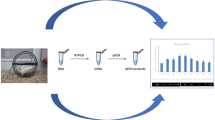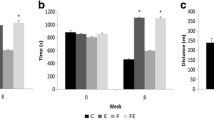Summary.
Endurance exercise training is known to increase fatty acid (FA) oxidation during exercise and to stimulate mRNA synthesis of mitochondrial carnitine acyltransferases in skeletal muscle. To test the hypothesis that long-term endurance training induces cellular adaptions in different tissues, we determined the relative mRNA abundances of these genes in skeletal muscle and in blood cells from young athletes and middle aged untrained persons. The first trial examined 6 cross-country skiers, at the start of high volume/low intensity exercise training and 6 months later, when training at the same exercise intensity had elicited a significantly slower rate of lactate accumulation. In the second trial of 24 middle aged untrained (12 placebo and 12 carnitine supplemented) probands the mRNA expression was determined at the beginning and after three months of a low intensity endurance training program.
A 5-fold increase of the muscle form of carnitine palmitoyltransferase 1 (CPT1B), a 4-fold increase in carnitine acetyltransferase (CRAT), and a 6-fold increase in the mRNA content of the main carnitine carrier OCTN2 in the muscles of the athletes were determined by reverse transcription quantitative real time polymerase chain reaction (RTPCR). The corresponding values examined in white blood cells were 12-(CPT1B), 4-(CTP1A), 3-(CRAT), and 5-fold (OCTN2).
In WBC of middle aged untrained subjects, the mRNA content of the liver form of the carnitine palmitoyltransferase 1 (CPT1A) was stimulated 2-fold (placebo group) and 8-fold in the carnitine supplemented probands. The relative abundances of CPT1B mRNA were increased by a factor of 3 (placebo) and 5 (carnitine supplemented), respectively. The mRNA abundances of OCTN2 increased 5-fold (placebo) and 7-fold (carnitine supplemented).
While the plasma carnitine levels also remained low during the study period in athletes, normal levels were determined in untrained subjects and significantly increased levels were found after carnitine supplementation. A marked increase of acylcarnitine excretion resulting in a reduction of the portion of short-chain acylcarnitines, other than acetylcarnitine, due to carnitine supplementation could be interpreted as a detoxifying function.
The results of the present study may offer the opportunity to use blood cells as a target for differential gene expressions and as an indicator for responses of skeletal muscle to exercise and/or nutrient supplementation.
Similar content being viewed by others
Author information
Authors and Affiliations
Corresponding author
Rights and permissions
About this article
Cite this article
Lohninger, A., Sendic, A., Litzlbauer, E. et al. Endurance Exercise Training and L-Carnitine Supplementation Stimulates Gene Expression in the Blood and Muscle Cells in Young Athletes and Middle Aged Subjects. Monatsh. Chem. 136, 1425–1442 (2005). https://doi.org/10.1007/s00706-005-0335-6
Received:
Accepted:
Published:
Issue Date:
DOI: https://doi.org/10.1007/s00706-005-0335-6




